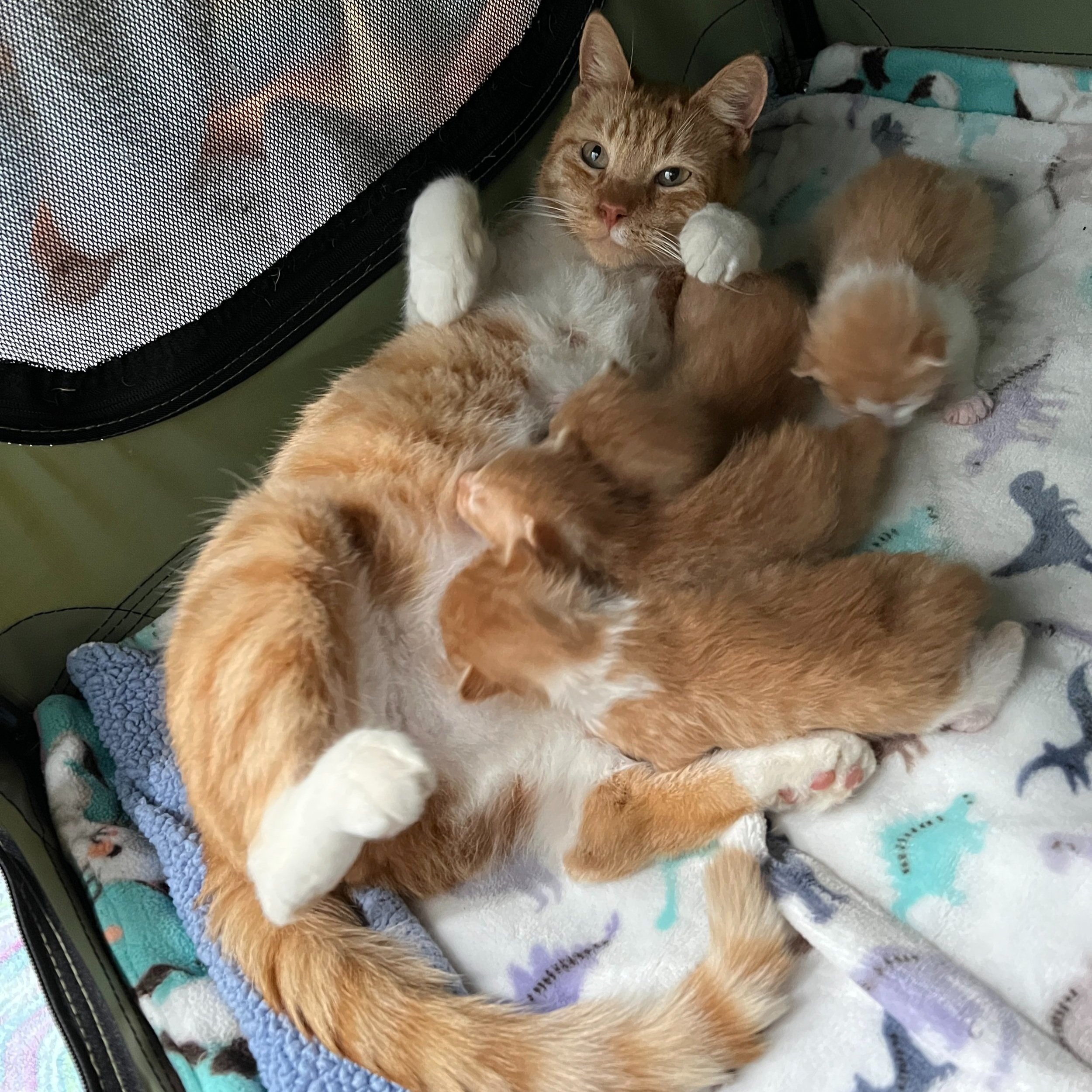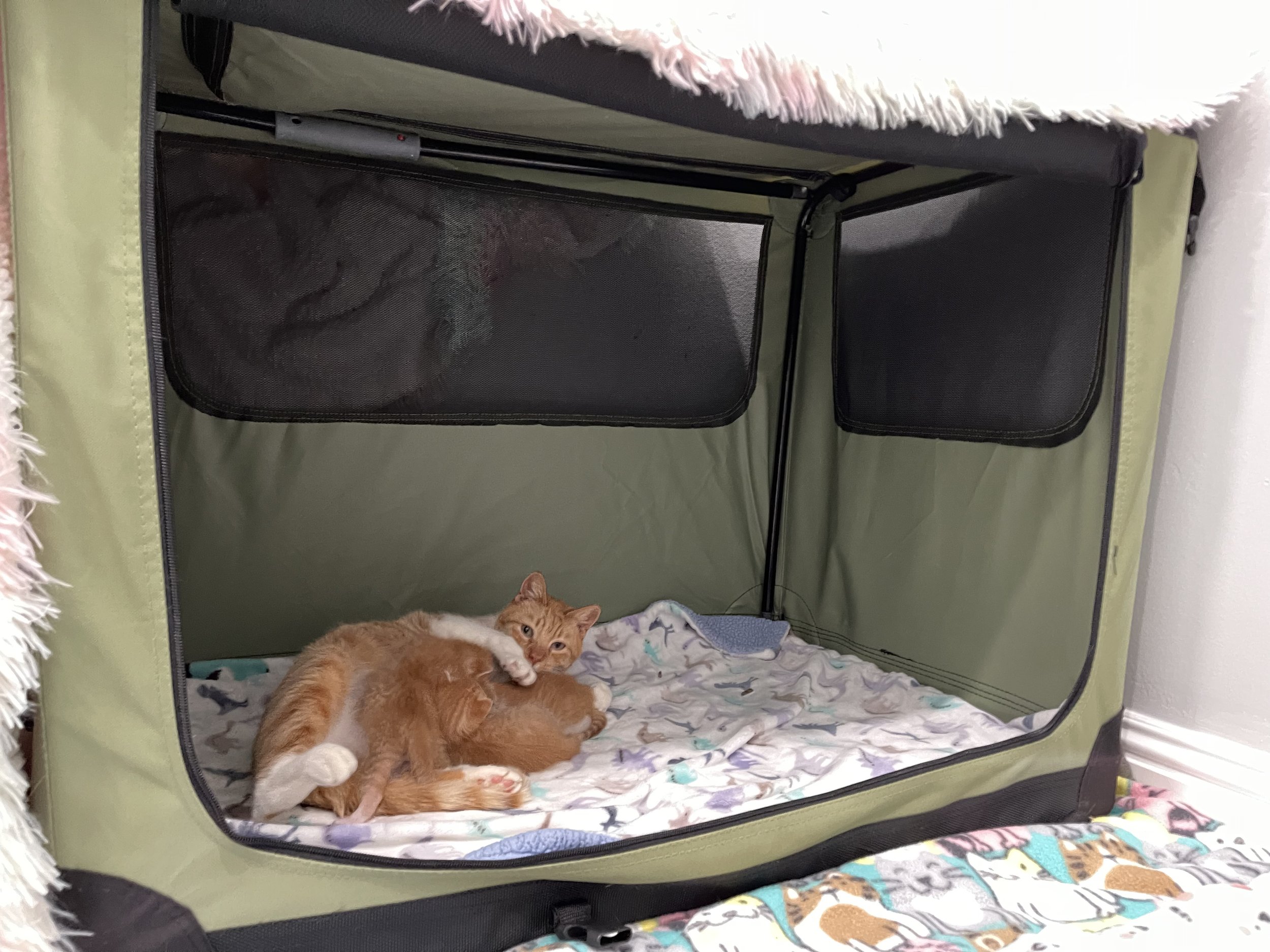How to Help My Cat Feed Her Kittens
How to Care For a Nursing Mama & Her Babies

Caring for a mother cat and her newborn kittens is one of the most rewarding experiences a foster parent can have. Read below and check out my video to learn how to help feline families thrive!
Watch My Instructional Video:
Create a Proper Space for Mama to Raise Her Young
Before bringing home the mama and babies, you'll want to get set up.
-
Choose a quiet, confined space. Mama cats shouldn't be given free access to the house due to the abundance of hazards, and because they may decide to bring their babies into an unsafe or hard-to-find spot. Instead, choose a room with a door like a guest room, bathroom, or laundry room where you can keep her safe and separate from the rest of the house.
-
Baby-proof the space. Many items that seem innocuous can become a hazard when fostering a mama cat and babies. Avoid deep cat beds where a kitten may get stuck or suffocate. Tie up strings on blinds. Remove tall cat trees and limit access to furniture that can be climbed, (like tall shelves) or hidden inside (like pull-out couches.) In general, the space should be extremely minimalist, with access only to kitten-safe items like baby blankets.
-
Don't introduce other animals. Even if your cat or dog is very friendly, introducing him to the mama will create a stressful and potentially dangerous situation. Mama cats can be fiercely protective of their young, and may attack an animal who gets too close. Her kittens will also have fragile immune systems and should be quarantined from other animals to protect the health of all.

A mesh dog crate makes a fantastic nesting box!
-
Create a purrfect nesting box. Mama cats will seek out an area to keep their babies, so get one step ahead of her and create a nesting box. This can be a large kennel, crate, or even a large box on its side; the important thing is that there is enough space for both mom and babies to stretch and lay comfortably during the first weeks of life. Place the nesting box into the corner of the room and line the bottom with a flat, soft blanket (no deep beds or bunched blankets, which can cause suffocation.) If mama is stressed, place a large blanket over top of the kennel to create a cozy cave.
-
Put out food, water, and a litter box for mama. Place these items in adjacent corners as far from where the babies will be as possible. Ensure that you are using a kitten-safe litter and that all food and water dishes are very shallow.
-
Keep the babies warm. Neonatal kittens cannot thermoregulate, and rely on external heat sources in order to stay a comfortable temperature. In general, they will stay warm through contact with their mama's body heat, but if the room is less than 70 degrees please provide them with a heat pad on low. Click here for advice on heat sources for kittens.
Recommended supplies:
Care for the Kittens
While mama does much of the work, you should think of yourself as her sidekick—a co-parent to the babies.
-
Monitor the kittens' weight. I can't overstress how important it is to weigh your kittens at least twice a day, even (and especially!) if they are being cared for by a mama cat. It's important to track their weight so that you can ensure they are getting enough food and are on a healthy track. If a kitten's weight is stagnate or dropping, you should be prepared to step in with supplemental feeding. Click here to learn how to bottle feed.
-
Monitor the kittens' health. While tracking weight is often the number one indication of a kitten's health, you should also be monitoring them visually for any signs of illness or injury. If a kitten appears to be having a health issue, contact a veterinarian without delay. Neonatal kittens can (and should!) receive veterinary care regardless of their age or size. Click here to learn how to examine a kitten from nose to tail.
-
Prevent disease spread. Always wash hands before and after interacting with the little ones. Wear booties or special socks when entering their space, especially during their first two weeks with you.
-
Handle the kittens daily. It's important to interact with the kittens so that they will develop a fondness for humans and good social skills.
-
Stay on top of preventative care. Work with a veterinarian (or your foster coordinator) to ensure that the kittens are meeting their milestones for deworming, vaccination, and other preventative health needs. Be sure that you've scheduled spay/neuter appointments for after the kittens are 8 weeks old.
Learn more about kitten care in my numerous articles, webinars, videos, and in my bestselling book, Tiny But Mighty.
Care for the Mama
Mama cares for kittens – you care for mama!
-
Feed mama ample amounts of kitten food. Kitten food is higher in protein and fat, which the mama will need as she is nursing her young. Be sure to provide large amounts of food at least three times a day, offering both wet and dry kitten food.
-
Provide a shallow dish of fresh water. Please never put a deep dish of water into a space with neonatal kittens, as this can be a drowning hazard. Provide water in a low, shallow dish.
-
Monitor mama's teats daily. Lactating cats can occasionally develop a painful mammary infection called mastitis, which requires immediate veterinary intervention. If you notice signs of swelling, redness, inflammation, bruising, or tenderness to the mammary glands, contact a veterinarian immediately. Antibiotics may be necessary, and the kittens may need to be bottle-fed until the mama has recovered.
-
Care for mama's health needs. If mama becomes ill, talk with a veterinarian and ensure that they are aware that she is nursing kittens before giving any prescription or over-the-counter medications. Not all medications are safe for lactation, so always talk with a veterinarian first.
-
If mama is friendly, give her affection. This part is easy and fun! Pet her, talk sweetly with her, and encourage her to occasionally come out and stretch her legs, sit in your lap or even play.
-
If mama is feral, don't force interaction except when necessary. Be sure to watch my video about how to care for a feral mama and babies.
-
Schedule a spay. Be sure that you're not only sterilizing the kittens, but the mama cat as well. It may be lovely to watch a mama cat care for her babies, but we certainly don't need more kittens being born! Spaying mama will be best for her physical health, for her happiness, and for the betterment of all kittenkind.
Watch my feral mama instructional video:
Check Out More Content From Kitten Lady
saephanfradenurry.blogspot.com
Source: http://www.kittenlady.org/mama


0 Response to "How to Help My Cat Feed Her Kittens"
Post a Comment